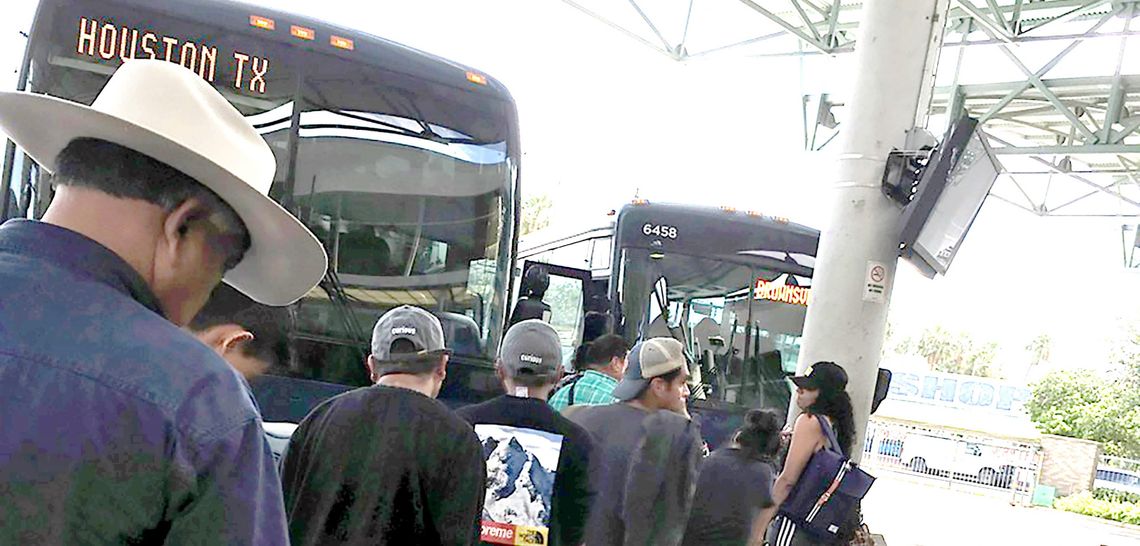Editor’s note: Below is the second part of a two-part series written by Kate McCarty, a longtime Hays County resident who recently traveled to the border to give supplies to migrants donated by Hays County Democrats. The second part focuses on advocacy groups assisting migrants at the border.
By Kate McCarty
Angry Tias and Abuelas started on June 3, 2018 when a few friends in Harlingen spotted 40 or more people camped out on the bridge over the Rio Grande River in Reynosa.
The people were from Mexico and the “triangle” countries of Guatemala, Honduras and El Salvador, along with a few from Cuba and even Eritrea. The women took snacks and water and umbrellas to the group.
“We drove to the bridge in McAllen and pulled our carts and coolers,” said Joyce Hamilton, one of eight founders of Angry Tias and Abuelas. “It was just this large group of people, and we pulled everything across. Some were sleeping on pieces of cardboard. Most said they had been there five days. One was carrying a 9-month-old baby.”
“We were appalled by what we saw and just shocked that our country would treat people this way. We were angry at the sense of injustice.”
–Joyce
Hamilton, one of eight founders of Angry Tias and Abuelas.
Before the Tias arrived, people from Mexico had been providing food and water, though not enough.
“We were appalled by what we saw and just shocked that our country would treat people this way,” Hamilton said. “We were angry at the sense of injustice.”
The scene at the border pushed the Tias and Abuelas group to start raising money to provide the snacks and water for those on the bridges. The group consisted of eight people ranging in age from early 30s to mid-70s Then they saw people being dropped off at the bus stations upon release from the detention center, so the second operation began.
In early June 2019, the group received the Robert F. Kennedy Human Rights Award, and donations have increased to the point that they often can send travelers on with a little spare cash.
“But with 1,000 people coming through sometimes in a day, the money doesn’t go too far,” Hamilton said.
While the crisis is hours away from Hays County, those along the Rio Grande Valley, who have shouldered the load without much outside help, need all the support they can get to assist migrants along the border.
They can use more donations, more volunteers who speak fluent Spanish and more attorneys willing to take on pro bono cases. While the Tias and volunteers are hard at work at the bus stations in Harlingen, Brownsville and McAllen, three other groups are assisting as well.
Loaves and Fishes of the Rio Grande Valley is an organization that has been helping the homeless and abused women with shelter and food for many years, according to Administrator Bill Reagan.
Last month, for example, the facility served 16,000 meals, 4,000 more than usual, just one sign of the stepping up of services due to the influx of migrants in need just now.
Inside the group’s spacious facility in Harlingen, the cots are stacked up and waiting for the next influx that was expected in mid-July. Supplies are ready to house and feed them as needed, and donations have made it possible to prepare for the next group. Loaves and Fishes insists that no one needing a bed will be turned away, Reagan said. In just two months alone, Customs and Border Protection released some 1,500 migrants into the Harlingen community, he noted.
Loaves and Fishes also had been sending pan dulces (sweet bread), milk and Spanish coloring books along to the bus station to help with the migrants as they awaited their buses, Reagan said.
Hamilton and I also visited La Posada Providencia in San Benito, sponsored by Sisters of the Divine Providence, an emergency shelter for men, women and families. Most clients arrive destitute and seek legal asylum or other legal recourse to begin new lives in this country.
Since 1989, La Posada has provided resettlement assistance to thousands of people from almost 100 countries. On the day we visited, we were greeted by a young woman and her baby who had immigrated from Cameroon via Mexico. She now has a work permit to help at the facility.
Catholic Charities of the Rio Grande Valley have been providing assistance to the needy and to migrants for many years from cramped quarters near the McAllen bus station. When the more recent influx began, they were overwhelmed. They moved to an abandoned nursing home in a neighborhood but lost that space after neighbors complained. Just recently the group was able to move into a spacious location diagonally across from the McAllen bus depot.
The morning I was there, a volunteer named Claudia and other staff met busloads of detainees being dropped off from detention with cheers and “bienvenidos.”
The most striking thing about this was the smiles on the family members’ faces as they were made to feel welcome and as they stepped forward to receive a sack lunch, other supplies and assistance on their roads to asylum.










